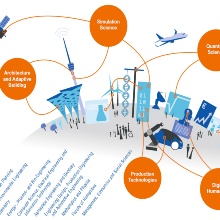At the beginning of his report, Ressel emphasized that the focus of his speech was going to be on the Excellence Strategy: “This has had a massive influence on the past year and has kept us busy”. He went on to say that the university had submitted four full proposals, and he was especially proud that they had not just emerged top-down but also bottom-up. The success of the two applications “Data-Integrated Simulation Science” and “Integrative Computational Design and Construction for Architecture” meant the prerequisites for taking part in the second funding line had been achieved, which means the university may apply for the title of University of Excellence. More than 200 people at the university took part in preparing for the application with the vision of ‘Intelligent systems for a sustainable society’, which had to be submitted on December 10, 2018. It was then inspected by the expert commission between March 13-15, 2019. “We did an absolutely excellent job representing our university”, explains the Rector enthusiastically, who also said that it gave him goose bumps. “When an expert asked who took part in the application, 200 hands suddenly went up.” He said this image really stood out, and showed how strong the feeling of togetherness at the university really is. All there is now is to wait until July 19, when the results will be released. A look at the competition for the title shows that there are 19 proposals. “The competition is stiff, even in Baden-Württemberg alone there are six different universities in the running.”
“Our application addresses some of the major challenges facing our society, such as the core topics of the energy revolution, health and mobility”, explained Wolfram Ressel. It includes the five focus areas of Architecture and Adaptive Building, Simulation Science, Quantum Science, Production Technologies and Digital Humanities. “They are based on the faculties’ subject knowledge, and are applied across disciplines across all faculties based on the Stuttgart method.” If the university’s application is successful, it will receive 95.185 million euros in funding over the course of seven years.
There are also plans to build two new potential areas, so-called “emerging fields”: Autonomous Systems and Biomedical Systems. “We want to recruit engineers and scientists to work in medicine”, explained the Rector, and reported on the cooperation with the Robert-Bosch Hospital in Stuttgart and the University Hospital Tübingen. Furthermore, the Institute for the Reflection of Intelligent Systems (IRIS) should be set up. “We have a long tradition here in Stuttgart which we want to build on”, says Ressel.
The latest research news
Two new Collaborative Research Centers (CRCs) have been added in the past year: the CRC1313 “Boundary surface-driven multi-field processes in porous media”, with spokesperson Prof. Rainer Helmig and the CRC1333 “Molecular heterogeneous catalysts in defined, managed geometries”, with spokesperson Prof. Michael Buchmeiser. The Rector went on to say that adding two new CRCs in one year is not just testament to the performances of the researchers involved, but also the solid administrative support provided by the central administration. However, Wolfram Ressel still sees room for improvement in increasing the number of research training groups and also the number of ERC grants.
Current developments in teaching and further training
The University of Stuttgart was once again successful in all five funding lines of the second installment of the “Successful studies in Baden-Württemberg” (FESt-BW) fund, and it performed well in the “Support for new students” category in the CHE University Ranking 2018. The Rector is likewise happy about the successful student-run activities, for example the student racing team InVentus, which has been one of the best of its kind in the world for a number of years and which was the runner-up at the 11th Aeolus Race, and the student experiment PAPELL, a maintenance-free pump for long-term missions in space, which was looked after by Alexander Gerst on the ISS.
Trends in student numbers
“Student numbers are declining, which is a trend which can be observed across Germany. However, the numbers remain high, even though the two year groups which both finished high school at the same time have now also passed through the university system”, summarized Ressel. The proportion of overseas students also remains high, at around 20 percent.
Budget data
The Rector was very pleased to report on the budget data. He said it was great to see the external funding being spread so widely.



